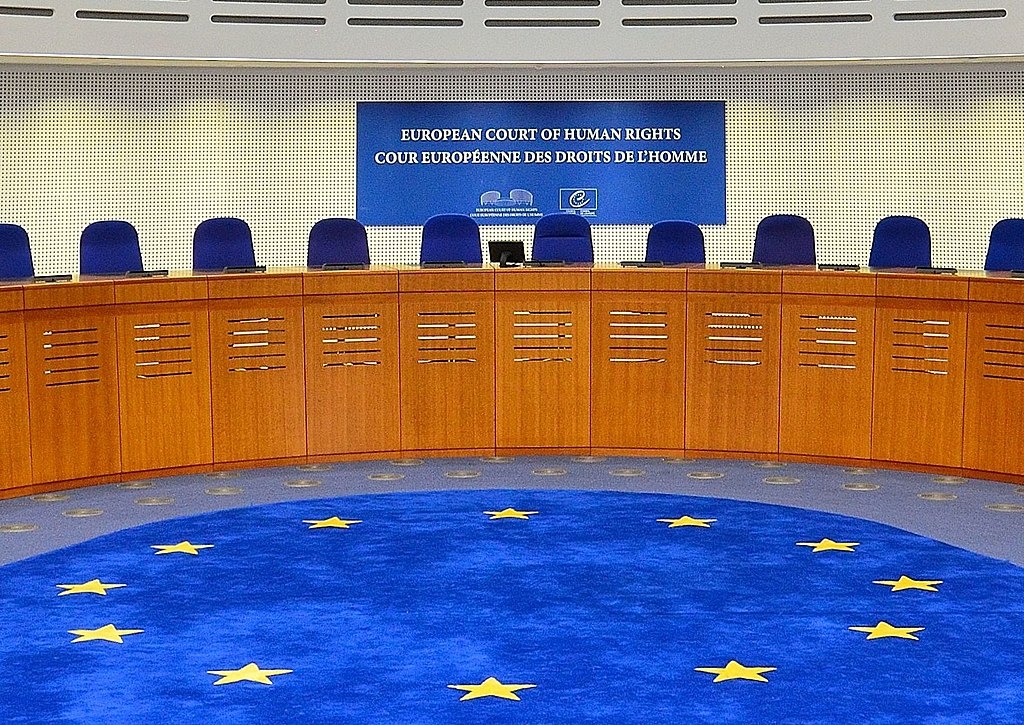THE EU'S DANGEROUS NEW CONFIDENCE GAME
by Douglas Murray
- The first problem of the European Court of Human Rights decision against Elisabeth Sabaditsch-Wolff is that it means that, at least in cases of blasphemy, truth is not a defence.
- Such a judgement hands over the decision on what is or is not allowed to be said not to a European or national court, but to whoever can claim, plausibly or otherwise, that another individual has risked "the peace."
- There have been similar mobster tricks tried for some years now. They all run on the old claim, "I'm not mad with you myself; I'm just holding my friend back here."

At the start of this decade, a minor story occurred that set the scene for the years that have followed. In 2010, a Saudi lawyer named Faisal Yamani wrote to the Danish newspapers that had published cartoons of Islam's prophet, Mohammed. Claiming[1] to act on behalf of 95,000 descendants of Mohammed, the Saudi lawyer said that the cartoons were defamatory and that legal proceedings would thereby begin.
However, everything about the supposed legal claim reeked. How had Mr Yamani located all these descendants? How had he come up with exactly 95,000 of them? And how could you claim that a statement about somebody who died 1,400 years ago was "defamatory"? Legally, one cannot "defame" the dead.[2]
Everything about the claim was laughable Yet it had its desired effect. At least one Danish paper -- Politiken -- swiftly issued an apology for republishing the cartoons. So Mr Yamani got what he wanted. He had (one might suggest) conjured up a set of alleged victims and cobbled together an alleged offence, but no matter, because he also got a European newspaper to fold in no seconds flat. It was an interesting probe of the European system of justice -- and a good example of submission. And a fine scene-setting precedent for the decade that has followed.
Now, eight years later, an even greater act of submission has come along. This one not imposed from some dodgy Saudi lawyer, but from the highest court in Europe.
At the end of last month, the European Court of Human Rights issued its ruling[3] in a long-running case involving an Austrian woman named Elisabeth Sabaditsch-Wolff. Way back in 2009, in Vienna, Sabaditsch-Wolff (who has lived in several Muslim countries) gave two seminars entitled, "Basic Information on Islam." During these talks, in the words of the ECHR:
"... she discussed the marriage between the Prophet Muhammad and a six-year old girl, Aisha, which allegedly was consummated when she was nine. Inter alia, the applicant stated that Muhammad 'liked to do it with children' and '... A 56-year-old and a six-year-old? ... What do we call it, if it is not paedophilia?'"
For this statement, based on the text of an official Hadith [the acts and saying if Muhammad], Sahih-Bukhari, Vol. 5, Book 58, Nos. 234–236,[4] the Vienna Regional Criminal Court, in February 2011, found Sabaditsch-Wolff guilty of "disparaging religious doctrines." She was fined 480 euros and ordered to pay costs. During an appeal the following December, the court upheld the decision. In December 2013, Austria's Supreme Court dismissed a request for the proceedings to be renewed.

So, Ms Sabaditsch-Wolff took her case to the ECHR, and filed her application in June 2012. In her defence, she cited Article 10 of the European Convention on Human Rights,[5] which is meant to protect freedom of expression.
The wheels of ECHR justice, however, grind slow, so it was not until last month -- a mere six years after the case was filed -- that the court issued its judgement. According to the ECHR ruling:[6]
"Relying on Article 10 (freedom of expression), Mrs S. complained that the domestic courts failed to address the substance of the impugned statements in the light of her right to freedom of expression. If they had done so, they would not have qualified them as mere value judgments but as value judgments based on facts."
The court ruled that the right of people to express themselves under Article 10 did not supersede the right of other people "to have their religious feelings protected" (under Article 9). The ruling states:
"The Court observed also that the subject matter of the instant case was of a particularly sensitive nature, and that the (potential) effects of the impugned statements, to a certain degree, depended on the situation in the respective country where the statements were made, at the time and in the context they were made."
Meaning, it would appear, that a statement might be protected in one European country and not in another.
"The Court noted that the domestic courts comprehensively explained why they considered that the applicant's statements had been capable of arousing justified indignation; specifically, they had not been made in an objective manner contributing to a debate of public interest (e.g. on child marriage), but could only be understood as having been aimed at demonstrating that Muhammad was not worthy of worship. It agreed with the domestic courts that Mrs S. must have been aware that her statements were partly based on untrue facts and apt to arouse indignation in others. The national courts found that Mrs S. had subjectively labelled Muhammad with paedophilia as his general sexual preference, and that she failed to neutrally inform her audience of the historical background, which consequently did not allow for a serious debate on that issue."
Just as importantly, the court concluded:
"... [Austria's] domestic courts carefully balanced the applicant's right to freedom of expression with the rights of others to have their religious feelings protected, and to have religious peace preserved in Austrian society."
The fact that Ms Sabaditsch-Wolff had been ordered by the Austrian court only to pay what the ECHR ruling called a "moderate fine" meant that the ECHR did not view the punishment as "disproportionate."
Of course all of this has provoked a range of responses, from people saying that the ECHR has overseen the insertion of a new blasphemy law[7] within Europe to those insisting that there is nothing to see here, and that the judgement is of absolutely no interest. Somewhere in the middle are a range of legal voices saying that all that the ECHR has done has agreed that the Austrian courts have the right to make their own decisions on this matter. So again -- there is nothing, or at least not much, to see here. Nothing could be further from the truth.
The first problem brought by the ECHR decision to uphold the Austrian court's verdict against Sabaditsch-Wolff is that it means that, at least in cases of blasphemy, truth is not a defence. There is -- as every Islamic scholar knows -- significant evidence from the Hadith to allow someone to make a perfectly plausible case along the lines that Sabaditsch-Wolff did. But the courts went further. They claimed that her statements were based on "untrue facts"[8] -- whatever those might be. As I have pointed out elsewhere, this poses a serious problem for Europeans. It tells us that words we can read with our own eyes, and which are in books freely available anywhere in the world, do not say the words that they say. What are we to do? Lie? Apparently so.
The second problem is that it turns it a debate about facts into a debate about "tone." Were certain things said in an "objective" manner or not? So, in the future, one European might state something in one tone of voice and another might state it in another -- and on that, a prosecution could be launched. While the first defendant can expect to be hauled before the court, the second may be allowed to continue to roam intellectually and physically free. Who is to decide that?
The third problem is, of course, that such a judgement hands over the decision on what is or is not allowed to be said not to a European or national court, but to whoever can claim, plausibly or otherwise, that another individual has risked "the peace."
Which returns us to the example of the 95,000 descendants of Mohammed. There have been similar mobster tricks tried for some years now. They all run on the old claim, "I'm not mad with you myself; I'm just holding my friend back here." In the Austrian case, as in the Danish one, it seems to have a disturbing ability to work. Yet in the universe of confidence games, this must be among the baldest and the worst.
Once one group of people sees that game working, why shouldn't everyone else play it too? Why shouldn't any other group in Austria other than Muslims claim, on a routine basis, that their feelings have been hurt and announce to the courts that, as a result, "peace" has been put at risk? If I were an Austrian Christian of a fundamentalist bent, I might well think about attending various lectures and sermons at a range of Austrian mosques, waiting until one of the speakers denies the divinity and resurrection of Christ and then run straight to the courts. After all, a denial of the resurrection of Christ by a Muslim could be deemed to be seriously offensive to a Christian and who is to say that "peace" will not be at risk as a result?
There is a complacency that has settled across Europe. This complacency is amply demonstrated by those happy to say that what has just happened at the ECHR is really nothing important. They are wrong. It is extremely important. Not just because it is an awful example of the morally bewildered decade we are in, but because it sets the stage horribly -- for Muslims and non-Muslims for decades to come.
Footnotes
[1] https://www.news.com.au/world/descendants-of-mohammed-to-sue-over-blasphemous-cartoons/news-story/e1480269a25cf25944a7f0b3a6f5985f
[2] https://blogs.lexisnexis.co.uk/wipit/can-you-defame-the-dead/
[3] https://www.gatestoneinstitute.org/13204/european-court-human-rights-sharia
[4] https://www.sahih-bukhari.com/Pages/Bukhari_5_58.php
[5] https://www.echr.coe.int/Documents/Convention_ENG.pdf
[6] http://hudoc.echr.coe.int/app/conversion/pdf?library=ECHR&id=003-6234980-8105265&filename=Judgment%20E.S.%20v.%20Austria%20-%20conviction%20for%20a%20critic%20of%20Islam%20did%20not%20violate%20Article%2010.pdf
[7] https://www.gatestoneinstitute.org/13204/european-court-human-rights-sharia
[8] https://blogs.spectator.co.uk/2018/10/should-it-be-illegal-to-insult-mohammed/